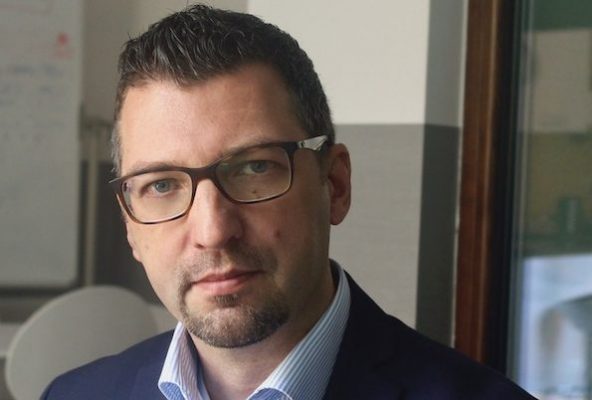13-14 March 2018 – At two-day Conference „EU and Western Balkans: towards greater credibility and engagement on both sides” held in Belgrade on 13-14 March 2018, results of our BENCHER project were presented (Benchmarking for EU reform – how effective?).
During the first day of the Conference, findings of regional comparative study created within the Project are presented; the aim of findings is to enable better understanding of EU mechanism for promotion and implementation of the Rule of Law.
First panel of the Conference brought the discussion on how EU could develop a more effective mechanism for the establishment of the Rule of Law and which main obstacles impeded this process. Panelists were Igor Bandović, Senior Programme Manager in European Fund for the Balkans (EFB), organisation which is one of the Donors of the Project, Ardita Abazi Imeri, Programme Coordinator in European Policy Institute (EPI) from Skopje, Alida Vračić, Executive Director of the think tank organization Populari from Bosnia-Herzegovina, Endrit Shabani, Researcher from Department for Policy and Interational relations of the Oxford University and Adnan Ćerimagić, analyst from European Stability Initiative (ESI). The panel was moderated by Sena Marić, Programme Manager and Senior Researcher from CEP.
Igor Bandović explained why it is important for civil society to be involved in discussion about Rule of Law and reforms in this area and why EFB decided to support this Project. He said that he, observing the way governments in the region treat the Rule of Law, noticed „worrying trend“ i the way how it is treated in the Western Balkans.
„You can not make any progress in the Rule of Law unless you do not have freedom of the media“, warned Bandović. „Rule of Law is not just judiciary reform, as it was ofter perceived. It is rule of normality, freedom and stability. Only if we adopt all this, we will make progress in this area and will be commended by European Commission“, said Bandović.
Abazi Imeri said that research showed that the Region has not advanced enough in this area and that „EU is too mild when negotiating chapters referred to the Rule of Law“, which leaves space for governments in the Region to interpret themselves what Rule of Law means, as well as to often neglect this issues, at the expense of resolving political issues and „political chapters“. Alida Vračić added that we have to be aware of the fact that reforms and democratizations are „neverending process“ and that we have to be „more realistic and less emotional“ when it comes to the EU accession negotiations.
About the importance on economic reforms and fight against corruption during reform process within the Rule of Law spoke Endrit Shabani. He said that he has no doubt regarding EU intention to help Western Balkans, but that he doubts that this will be achieved by the current approach.
Responsibility in this area in also on the EU, agreed Ćerimagić. Commission has to communicate better and better present its findings in this area, but it should make additional efforts to explain to the citizens why certain reforms need to be implemented.
The second day of the Conference was dedicated to the consideration of effectiveness of the EU approach to the Rule of Law in Serbia, with special review after opening of accession chapters 23 and 24. Dragana Bajić, Researcher from CEP, presented CEP study, related to this subject, which provides significant findings referred to the factors which influenced limited Serbia`s achieved results in these two chapters. She said that, although certain progress was achieved in some of the parts, in majority of them there have been „stagnation, if not regression“ since 2006.
„EU conditionality is not an universal remedy. We as civil society often overestimate the rule of Union in the refom process – as if we forget that the main responsibility for the implementation of the reform is on the state“, emphasized Bajić.
Deputy Commissioner for Protection of Equality, Tatjana Jokanović, spoke about the importance of the fight against discrimination, especially among youngest population, as well as about activities of the Office of Commissioner in this area. Noora Häyrinen, Head of the Political Section, EU Delegation in Serbia emphasized that „difficult chapters“ as 23 and 24 are, do not have to be left for the end of the process, but it is necessary to work on them continuously. She praised Serbia for making a huge move by making the European Commission`s six-month progress report in these chapters (the so-called “non-paper”) available to the public, although it is not bounded by the rules to do so.
Milan Antonijević, Director of Lawyer`s Committee for Human Rights (YUCOM) expressed concern and dissatisfaction with the Rule of Law in Serbia. In certain areas, for example, regarding the presumption of innocence, Serbia doesn`t have good position: presumption of innocence is not respected, neither by the courts and state authorities, especially media, said Antonijević. Also, Condition is bad when it comes to the asylum seeking, said Radoš Đurović, Executive Director of Asylum Protection Center. Asylum seekers are in legal vacuum in Serbia and within total number of the people which expressed wish for asylum, small number succeed to submit this request; movings of migrants among various reception centers are often, regardless the fact that they have been registrated in certain place for longer period of time, underlined Đurović.
Panel was moderated by Sena Marić, Programme Manager and Senior Researcher from CEP.
BENCHER Project, implemented in cooperation of CEP with the partners from Think for Europe Network (TEN) is financially supported by European Fund for the Balkans (EFB) and Open Society Initiative for Europe (OSIFE). More about the Project you can find here.

